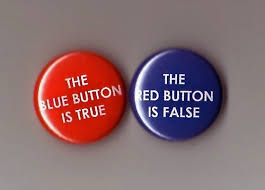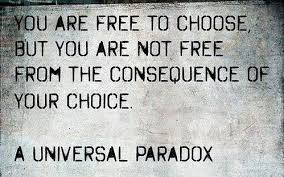What humanity lost was not a paradise. It was a paradox- a prison called paradise, a contradiction of terms more striking than Coolio’s ‘gangster’s paradise’ or Tupac wondering ‘if heaven got a ghetto’. Adam lost a paradise of restraints, of daily routine, of default romance, of regular divine patrol, of regulated human happiness. His promised rule over planet earth was scaled to a miniature garden.
His dream of greatness could not surpass a gardener’s gallantry. His ultra-natural intelligence was suited only for a career in gardening. For Eve, it was a garden filled with promises- promises that found expression only in a world of forms, a world in Eden transcending the garden, a field of forms where the serpent lived. And what she lost was her unrequested life, a perfunctory love, her unmet desires and an overrated lover. They lost Eden, the beautiful botanical paradise, but more importantly, they lost with Eden a den, their anthropological zoological gar-den.
Outside this paradise only was the place to find their human dream. Outside this goddam garden the bipolar bliss of nakedness and saneness and their innocent gnosis of ignorance could find its cure. Out here in our world our arch parents found their inherent liberty that was waiting out here all the while they were relishing a regimen of fruits in the gardener’s den. Here they could fire and hire God. Governance is now by the people for the people. They could think anything and have everything. They could look at God in the face and demand blood supplements or meat nourishment and their liberal God would comply. What a world of omnivorous opportunities for Cain and Abel to live in, of homosexual heterodoxy to live by in Sodom and Gomorrah and of self-satisfaction to live for by every girl or boy. For here at last Adam had found royalty and forced loyalty. The eternal and preternatural imperialists could only hold forte as far as the surreal time zone of Eden. Beyond Eden, here and now, Adam is the governor of the earth, from the earth and for the earth. That was the delayed deal. Eve likewise was the goddess of the earth, from the earth and for the earth. For that was what she dared to be. And if there was hope of reconciliation between us cosmic natives and the colonial divinities, it was in the prophecy, promise and person of the divine son of Eve.
But it was here in the real world also that they had found real pain and sorrow. It was out here that Adam had known real struggle – dualism within and danger without. It was here Eve saw her first boy’s malice birth a cold blooded murder. It was here, out here, that she had learnt the pain of birth and death, seen an animal’s carcass before and now her boy’s corpse. It was here that Cain’s plenty ritual and emptied ego echoed a fatal envy. It was here Abel had found brotherhood and association, betrayal and assassination.
And it is here and now too, that we search blindly endlessly for the colour of light within the spectra of the sun. It is here that we build peace with bombs, bullets and pellets of pain. It is here that men with chicken hearts rape the vulnerable like all male chickens do, that the taxonomy of our human existence has dipped below wild animals or flowers by our strange pollination from like gender.
Yet it was that paradox, those limiting liberties of paradise that made their luxuriant habitat a heaven on earth. It was that perfect harmony of evil and good, the peaceful cohabitation of death with life that made paradise the lost wonder of our world. As John Milton put it: In this pleasant soil /His far more pleasant garden God ordained; /Out of the fertile ground he caused to grow /All trees of noblest kind for sight, smell, taste; /And all amid them stood the tree of life, /High eminent, blooming ambrosial fruit /Of vegetable gold; and next to life, /Our death, the tree of knowledge, grew fast by, /Knowledge of good bought dear by knowing ill.
The point is that paradise is not the absence of evil. It is the presence of good. Today we still have paradise in our world, for wherever there is good, there is paradise. But what we lack is the blessings and bliss of that good in our contemporary paradise. We escape it each time we misunderstand the presence of evil and misuse the good thoughts and things, each time we misinterpret the paradox of the mutuality of evil and good as a choice to elect either instead of our chance to understand the intricacies and inversions of the good. How then can we relate with this paradox for our gain and realise a paradise again? It is to connect with these realities:
Paradise is first a consciousness- an awareness of existence. It is the knowledge that one is and that good is the existent- that evil is a form and its essence is good. This is the theodicy of Eden- that all that God has designed is good. And this is why evil was good, bad but ultimately beautiful in Eden. The sight of evil was desirable only when it was left untested in inertia within the confines of good, like nuclear powers untested. The taste of evil could only be pleasant to Eve for its inherent original goodness- the bittersweet residue of remedy and relief distilled from its many maladies and tragedy. And it smelled of wisdom only for its retributive means and redemptive ends, serving the purpose of probation more than prohibition. From a good seed a bitter root may germinate. But from that bitter root a good tree may flourish, with fruits that build life, leaves that bring healing, flowers that fill the air with fragrances of love and hope and a shade of peace and rest. Good is the only existent seed and no matter how bitter is the process of death, germination and life, the fruit of good will be good. Thus the good seed of the woman has brought good fruit and tree- the tree of life through His experience of conception, birth, living, death, burial and resurrection. Paradise is a consciousness of good- to be obsessed by the good, to seek the good of all things in the world and see only that good.
Paradise is also a conscience- the apparatus of truth in an ambience of ethics. It was the gardener Adam’s appreciation of his environment that informed first his cultivation of the soil agri cultura and then cultivation of the soul cultura animi. The conscience in like manner can only be cultivated first by circumspection of its surrounding realities. It is this discernment in its sublime form that is referred to as the Truth. Paradise is sustained only by the Truth. Truth examines the existent. It expounds the Good, that is, that which is mentally and mutually blissful, morally and materially beautiful. It evolves an interplay of remote benefits and immediate behaviour. The first principle then is to discern the truth from truths, to distinguish the good from another goodness, like evil. We can have our paradise back if we realize that the lie cannot exist alone, that it needs the truth to live, that a lie is just a variant of truth, an evil strain of sincerity. Having known these, to choose Truth and to do good.
For instance, the truth makes us see that Paradise is not consensual sex. It is a conjugal experience. Paradise is not peace on earth. It is peace within each heart. It is not the committee of nations or world powers. It is a domestic garden, a community work, a neighbourhood watch, an orange shared, a wife and husband loyal to each other, the vulnerable and valiant living together, a playground for Arabs and Jews, a park for blacks and whites. Paradise is not lost. Paradox was lost. It is not civil liberties. It is freedom from evil. Paradise is not the absence of warfare. It is the presence of welfare. It is not the presence of religion. It is the absence of delusion. It is not the absence of sin. It is the presence of salvation. It is not the absence of the serpent or the scorpion. It is the presence of the lamb and the lion. It is not the absence of Satan. It is the presence of God. Paradise is not the absence of darkness. It is the presence of the Light.
It is the gardener faithful in all his gardening, a husband faithful in all his house, a hireling leading the sheep in the desert of Sinai. It is not a statesman, leader or law-giver with a fatal flaw. Paradise is not complicated scenery. It is a simple life, a simple love, a simple liberty, a simple land charted by the simple truth. More than Pilate could understand, Paradise is that conscience guided by the truth.
Ultimately, paradise is coherence. It is a synoptic vision of existence, essence and experience. Paradise is all things being held together. It is peace. It is heaven and earth fused in time and place. It is humanity and divinity reconciled in each soul. It is mortality and immortality residing in each terrestrial body. It is the Paradox of the God-man. It is an in-Christ reality. It is crisis but not chaos. The quintessential coherence is Christ.
Paradise is the paradox. It was never lost. It was here with us all the while.


One thought on “Paradox Lost”